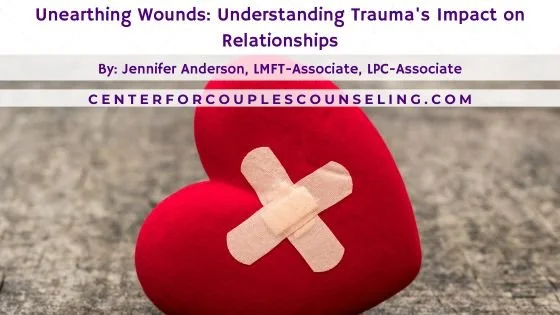Unearthing Wounds: Understanding Trauma's Impact on Relationships
We all enter new relationships with the lens of our previous experiences and expectations. It takes time for the complexity of your partner to come into focus. It’s often a combination of attraction and similarities that tend to ignite the first sparks. The more you get to know someone, you learn the ways they receive your behaviors and communication styles are different than what you expected. It’s what we do with those differences that can create a safe place for a secure and thriving relationship.
The goal is to create an environment where two people can be vulnerable to express why they reacted in a certain way to your behavior. When you dive deeper, you normally uncover traumas that tend to make each other’s reactions come from a place of insecurity and fear. More often than not, the trauma produces an unproductive thought that, “if I share this with my partner, they will run”. This is so normal!
However, when we withhold this knowledge from our partner, it creates a sense of fragility in the relationship. When someone really cares about you, they know there's something more to the equation. It also prevents the couple from deepening their emotional intimacy and understanding of one another. Let me highlight some ways to navigate difficult emotions in a relationship, related to trauma.
Patience and Compassion
As a therapist, the best thing I have learned is that you don’t have to put the pressure on yourself to say the exact perfect thing when someone is discussing their trauma. Less is more. Often the most important thing is to just be with that person and validate difficult emotions. If you are confused at any point of what to say, get curious.
It’s okay to reflect back on a difficult emotion they expressed. If your partner gets frustrated or starts getting dysregulated, don’t take offense. This is where compassion and patience get tested. They need to know in that moment you still support them and that you are a safe place. What’s the end game? They are loved no matter what. Let them feel this.
Open communication
The roots of trauma are unique to each person. Triggers to that trauma are going to be just as diverse. As long as each partner is creating a safe place for open communication, healing from that trauma is possible.
1. Only listen. DO NOT INTERRUPT.
2. Don’t label or villainize the other person or event. Stay with the experience of your partner and follow their lead in how they talk about it.
3. Respect their pace. Sharing can be painful. Respect how much they’re willing to disclose at any given time.
3. Simply asking “What’s that like?” can be really powerful.
4. After they share, ask them if they want to hear anything from you: a reflection of what they shared, your own emotional impact from hearing it, requests for a different approach in the future, solutions, touch, etc.
Clear boundaries
Traumas can bring the need to establish clear boundaries when navigating subjects related to what each partner has experienced. Maybe one partner has experienced sexual trauma, and they need to implement behaviors that make them feel safer before intimacy. You providing them with that support lets them know you respect them and they can fully trust you.
Professional help
Sometimes the trauma warrants professional help for individual work, while also engaging in couple’s therapy. I often send one partner to seek an individual therapist in order to have the biggest impact on their healing.
While trauma makes navigating relationships more challenging, if you are in a supportive relationship, it also creates the space for healing and growth. This is why I feel couples counseling is so important! Supporting your partner, as they heal from a past trauma in session, creates a stronger bond. With open communication, clear boundaries, and some personal work, it is possible.
My name is Jennifer Anderson and I’m a Licensed Marriage and Family Therapy Associate and a Licensed Professional Counselor Associate with the Center for Couples Counseling. I love working with couples who are looking to build strong and secure relationships, who are ready to take accountability for their own actions, and who are willing to make changes and increase vulnerability to grow closer and enhance the connection in their relationship. I help couples and individuals in the League City, Kemah, and Houston, Texas areas, and residents of Texas online. Call (832) 827-3288 to schedule a free 15 minute consultation. I’d love to help!
Begin Couples Therapy in League City, TX
We know relationships take a lot of hard work. But your relationship is important and deserves the effort. At Center for Couples Counseling we want to help you and your partner get back on the right track. To get started with in-person or online couples therapy follow these simple steps:
Meet with one of our skilled couples therapists
Begin to see positive changes in your relationshipOther Services Offered at Center for Couples Counseling
Other Services Offered at Center for Couples Counseling
At the Center for Couples Counseling, we understand you or your relationship may be facing different challenges. To help you work on yourself and your relationship, our Texas practice offers individual therapy, infertility counseling, postpartum anxiety, and depression counseling, therapy for self-care and burnout, and therapy for perfectionism. For more about us check out our FAQs and blog!

